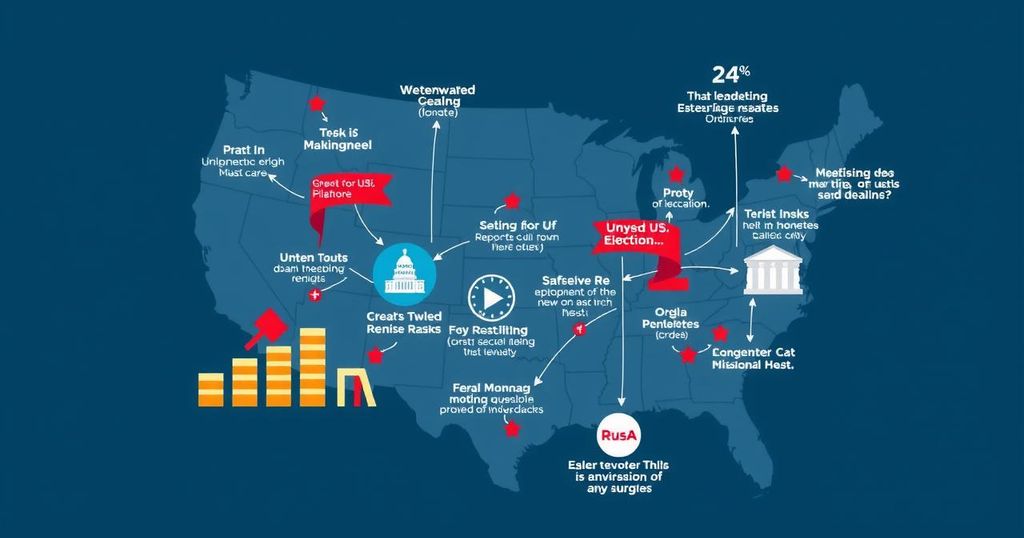The Global Stakes of the U.S. Election
The U.S. presidential election set for Tuesday will have substantial global repercussions, particularly in relation to China, Israel, Africa, and climate change. Candidates Kamala Harris and Donald Trump present divergent foreign policies that could substantially influence international relations. Beyond the election, current geopolitical tensions, including Russia’s advance in Ukraine and North Korea’s missile testing, further heighten the stakes on the world stage, making the election outcome vital for global stability.
The upcoming U.S. presidential election, taking place on Tuesday, has significant implications for global politics, as the winning candidate—Kamala Harris or Donald Trump—will influence international relations and critical policy decisions. According to Keith Bradsher, Beijing bureau chief, both candidates are expected to adopt a firm stance towards China, though their approaches differ significantly. Trump advocates for comprehensive tariffs which could significantly impact China’s economy, while Harris is inclined to use targeted tariffs grounded on national security. In the Middle East, Patrick Kingsley highlights a stark difference in how each candidate would approach Israel. Polls suggest that Israelis favor Trump, who may prioritize less oversight of Israeli military actions but has a less predictable stance on Iran and Palestinian issues. Contrastingly, Harris would likely pressure Israel to work towards a cease-fire but would maintain military support. John Eligon notes that perceptions of Trump in Africa are complex; despite his disparaging remarks about the continent, some view him as a decisive leader similar to dictatorial figures. The stakes extend to climate policy as well, with Somini Sengupta asserting that the U.S.’s forthcoming decisions regarding emissions, the highest historically, will significantly affect global climate outcomes. As the election nears, the broader geopolitical landscape remains uncertain, with various regional stakeholders poised to react to the results. In relation to ongoing global conflicts, Russia’s recent advances in Ukraine signal a shift in momentum, as it has made significant territorial gains in the Donbas region—an effort that positions Russian forces strategically for further assaults. Concurrently, North Korea’s provocative missile testing continues to raise tensions, compounded by ongoing diplomatic efforts from the U.S. seeking to curb North Korean military engagements in response to its partnerships with Russia. Other noteworthy international developments include severe flooding in Spain, a deadly typhoon impacting Taiwan, political upheavals within Mexico’s Supreme Court, and a new economic strategy from the Labour Party in Britain. The sports realm also sees increased engagement, particularly in Japan, where the World Series draws immense interest, reflecting the country’s enduring passion for baseball.
The U.S. presidential election serves as a pivotal moment not only for Americans but for many around the globe due to the significant influence the presidency wields over international affairs. The contrasting foreign policy approaches espoused by the candidates, specifically regarding major powers such as China, the Middle East, and climate change, illustrate how their leadership can reshape global dynamics. The election arrives amid various international crises, including the Ukraine conflict, the North Korean missile tests, and climate challenges, all of which highlight the interconnected nature of modern geopolitics and the repercussions that flow from U.S. policy decisions.
In summary, the upcoming U.S. election has far-reaching implications that extend well beyond national borders. Kamala Harris and Donald Trump represent two distinct approaches to foreign policy issues that affect global economies, conflicts, and environmental concerns. As the world watches closely, the outcome of this election will likely dictate international relations’ course for years to come, demonstrating the intertwined fates of nations in an increasingly globalized world. The responses from global leaders and regions will be critical following the announcement of the election winner, as alliances and strategies will be reconsidered in light of new U.S. leadership.
Original Source: www.nytimes.com




Post Comment